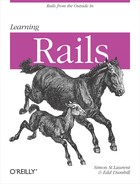Specifying a simple match pattern may take care of most of what you need regular expressions for use in Rails, but there are a few additional pieces you should know about before moving on. Even if you don’t match something that needs these, knowing what they look like will help you read other regular expressions when you encounter them.
There are three classic symbols that indicate whether an item is optional or can repeat, plus a notation that lets you specify how much something should repeat, as shown in Table C-5.
Table C-5. Options and repetition
Syntax | Meaning |
|---|---|
| The pattern right before it should appear 0 or 1 times. |
| The pattern right before it should appear 0 or more times. |
| The pattern right before it should appear 1 or more times. |
| The pattern before the opening curly brace should
appear exactly |
| The pattern before the opening curly brace should
appear at least |
| The pattern before the opening curly brace should
appear at least |
You might think you’re ready to go create expressions armed with this knowledge, but you’ll find some unpleasant surprises. The regular expression:
/1998+/
might look like it will match one or more instances of “1998”, but it will actually match “199” followed by one or more instances of “8”. To make it match a sequence of 1998s, you would write:
/(1998)+/
If you wanted to specify, say, two to five occurrences of 1998, you’d write:
/(1998){2,5}/The parentheses can also be helpful when specifying choices,
though for a slightly different reason. If you wanted to match, say,
2013 or 2014, you could use | to
write:
/2013|2014/
The | divides the whole
expression into complete expressions to its left or right, rather than
just grabbing the previous character, so you don’t need parentheses
around either 2013 or 2014. Nonetheless, if you wanted to do some thing
like match 2013, 2014, or 2017, you might not want to write:
/2013|2014|2017/
You could instead write something more like:
/201(3|4|7)/
